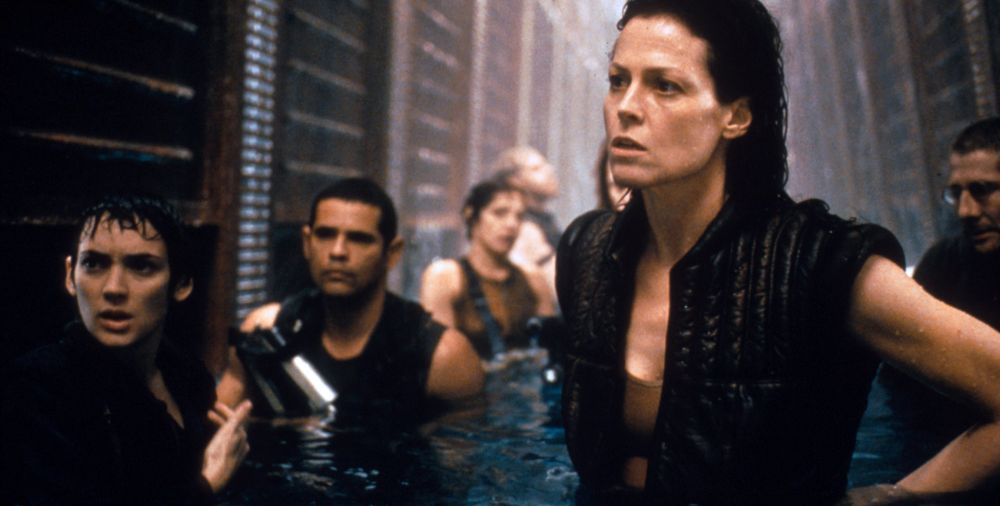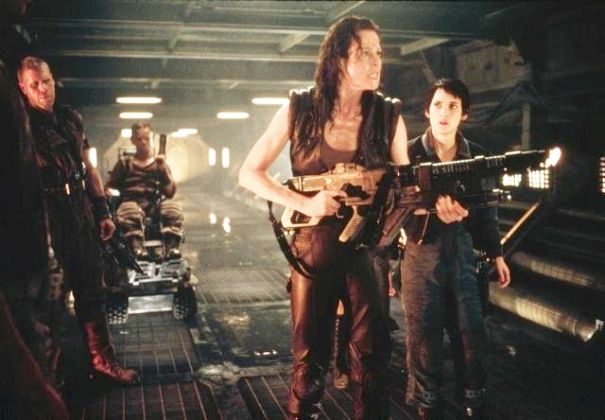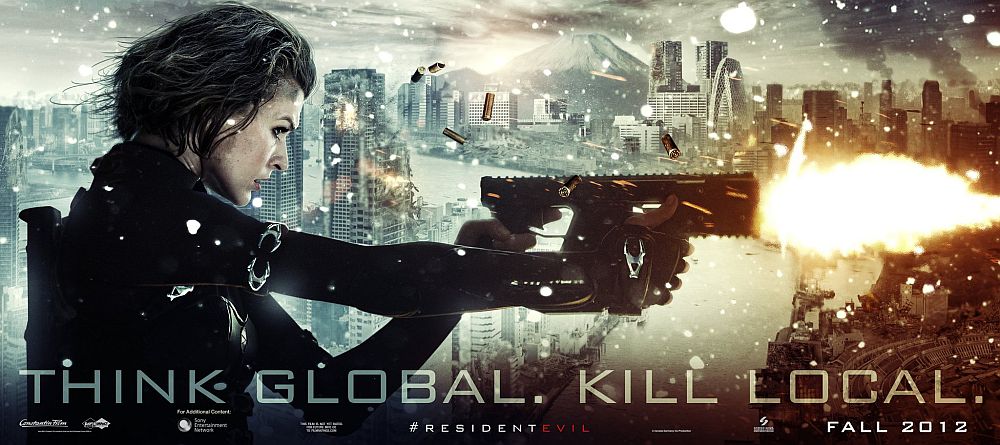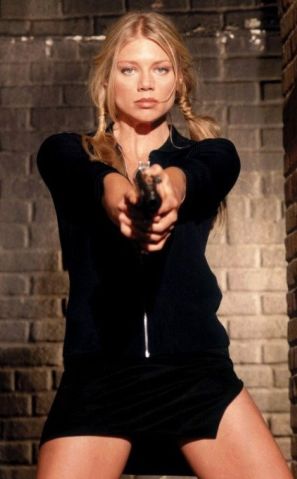★★½
“Only women bleed…”

The Hardcore genre is denigrated by some pro-wrestling fans as “garbage wrestling,” but I’ve never quite felt that way. To be good, you still need many of the same skills necessary to be good at the more regular end of sports entertainment: ability to work the crowd, sell the offense of your opponent, put over a storyline, etc. It’s true, you don’t need much in the way of technical aptitude to let someone break a fluorescent light-tube across your head, but the willingness to do so is certainly worthy of undeniable respect (if coupled with questions about your sanity). The bottom line is, there are good “garbage wrestlers” and there are bad ones. We’ve seen both in our previous coverage of the genre, when we wrote about FMW: Torn to Shreds, where we saw Megumi Kudo and Shark Tsuchiya, who represent the two ends of the spectrum.
We’ve also spoken before about the gulf betwen Japanese women’s pro-wrestling and the largely pathetic excuse for it put out by the WWE, where two minutes of a glorified cat-fight passes muster as a title match. You need to abandon network TV and go down to the independent level if you want to look for anything comparable – in style, if not necessarily in quality – to joshi puroresu, and it’s there that we found this. The IWA Mid-South federation had been holding annual “King of the Deathmatch” tournaments for quite some time, the first being won by Ian Rotten, one of the most well-known/infamous garbage wrestlers (current WWE heavyweight champion, C.M. Punk was part of the 2004 event, in a non-deathmatch bout). But in 2006, they also staged a similar event for women wrestlers.
 Of course, this being independent wrestling where the phrase “card subject to change” is a given, the eight women scheduled to complete ended up being seven and a man. MC Ian Rotten said that Delilah Starr had a car-crash on the way here, and another competitor, LuFisto, had broken her hand fighting another notorious garbage wrestler, Necro Butcher, in a Canadian Death Match tournament called “Bloodstock”. Taking advantage of the open spot was SeXXXy Eddy, a male wrestler with a long history of intergender matches, which his in-ring persona thoroughly enjoyed, as you can imagine from his name. The roster also included reigning IWA women’s champion Mickie Knuckles, Rachel Putski (grand-daugher of WWE Hall of Famer Ivan Putski), and two joshi wrestlers, Mayumi Ozaki and Sumi Sakai.
Of course, this being independent wrestling where the phrase “card subject to change” is a given, the eight women scheduled to complete ended up being seven and a man. MC Ian Rotten said that Delilah Starr had a car-crash on the way here, and another competitor, LuFisto, had broken her hand fighting another notorious garbage wrestler, Necro Butcher, in a Canadian Death Match tournament called “Bloodstock”. Taking advantage of the open spot was SeXXXy Eddy, a male wrestler with a long history of intergender matches, which his in-ring persona thoroughly enjoyed, as you can imagine from his name. The roster also included reigning IWA women’s champion Mickie Knuckles, Rachel Putski (grand-daugher of WWE Hall of Famer Ivan Putski), and two joshi wrestlers, Mayumi Ozaki and Sumi Sakai.
The first round got under way with a Staple Gun Match between Knuckles and Ann Thraxx: it was best of 13, so the first to embed seven staples in their opponent won. Knuckles was busted open immediately, but this was very much equal opportunity carnage: as the pic on top shows, the red, red blood contrasted nicely with Thraxx’s bleached blonde hair. The score was tied at six with a staple to Knuckle’s crotch, but she took the win by tacking a dollar bill on Thraxx’s nose. Next up was a disappointingly bland thumbtack match, with Putski taking on Vanessa Kraven in ring containing a small box of tacks: it was Kraven’s first death-match, and you could tell her heart really wasn’t in it. Add another skill to the list necessary to succeed as a garbage wrestler: commitment.
The third match was improved, though from a strictly aesthetic and visual sense, was hard to watch. Amy Lee – about as far from a WWE diva as it’s possible to get – took on SeXXXy Eddy, who was wearing what can only be described as a “banana hammock”. This was a “Four Corners Of Pain” bout, with the corners of the ring behind home to barb-wire/salt, mousetraps, fluorescent light-tubes and..,er, lemons? Life gives you lemons, you…stage a death-match. That said, this was mostly fun for Eddy’s antics, not least his epic selling of the mousetraps: though he won, he took care in the post-match interview to put Amy over, for which he deserves credit. The first round finished with Mayumi Ozaki taking on Japanese colleague Sumie Sakai, in a Barbed Wire Ropes and Boards match: this was basically a squash, Sakai taking all the damage, as Ozaki prevailed.
Moving on to the semi-finals, the first pitted Knuckles against Putski in a Taipei Death Match. In this, the wrestlers’ fists are taped, dipped into glue and then in broken and crushed glass, to turn their fists into nasty weapons – its use here may have been because the most infamously bloody of these was between tonight’s MC, Ian Rotten, and his “brother” Axl, at a 1995 ECW show. This one is not much less messy, especially when the two wrestlers set up on facing chairs, and take turns whaleing away at each other’s foreheads [a common target in this kind of wrestling, being an area not likely to incur permanent damage, but capable of generating plenty of the red, red kroovy, as A Clockwork Orange called it, running down the face]. Knuckles prevailed, but hard to say who lost more blood.
Osaki took on Eddy in a two out of three, light-tube log-cabin match. You’re wondering what a light-tube log-cabin is, aren’t you. Those are fluorescent tubes, taped together in a square, four to a side and maybe stacked four interweaved rows or so high. They make a very satisfying crunch when you drop your opponent through one, as we discover here. One thing wrestling fans know, is “two out of three” anything means the first two will inevitably be split, and that’s the case here: Ozaki gets backdropped through the first log-cabin, but comes back with a flying kick off a chair to send Eddy into the second. She takes the win after he tries a high-risk manoeuvre off the top rope, only to be grabbed by his banana hammock and flipped through the deciding log-cabin. Ozaki, again, appears to avoid significant damage.
 The final, between her and Knuckles was officially described as a (deep breath!) “No Rope Barbed Wire Fans Bring The Weapons Electrified Lighttubes Cage Match”. Basically, pretty much anything went, inside a steel cage which came already furnished with a ladder, beer barrel, barbed-wire ropes, a host of other offensive shrapnel (barbecue fork, baking tray, and bizarrely, a light-up magic wand with a star on the end) and enough fluorescent light-tubes to illuminate Vegas – yes, some of which were plugged in and working, for added emphasis. It is, I think, the first wrestling bout I’ve seen where the referee wore eye-protection. Knuckles hadn’t even bothered to clean up after the last bout, coming to the ring still covered in dried gore from her semi-final.
The final, between her and Knuckles was officially described as a (deep breath!) “No Rope Barbed Wire Fans Bring The Weapons Electrified Lighttubes Cage Match”. Basically, pretty much anything went, inside a steel cage which came already furnished with a ladder, beer barrel, barbed-wire ropes, a host of other offensive shrapnel (barbecue fork, baking tray, and bizarrely, a light-up magic wand with a star on the end) and enough fluorescent light-tubes to illuminate Vegas – yes, some of which were plugged in and working, for added emphasis. It is, I think, the first wrestling bout I’ve seen where the referee wore eye-protection. Knuckles hadn’t even bothered to clean up after the last bout, coming to the ring still covered in dried gore from her semi-final.
This one was relatively brief, and must confess, I actually found it somewhat disappointing, especially considering it was supposed to be the grand final. It felt almost as if both women had been drained by the previous encounters, so (understandably) had little energy left for their third match of the night. There was some breaking of glass and some mild use of foreigh objects, but it lasted only a little more than seven minutes in total, before Knuckles kicked through one of the electrified light fixtures into Ozaki’s forehead, following up with a pin for a three-count and victory. She didn’t really get to enjoy her title for long, as LuFisto and Kraven came in, blindsided her and left Knuckles draped in a Canadian flag, obviously intended to set a grudge-match up for the next IWA Mid-South event,
This is not great wrestling, by any means: matches generally proceed at a sluggish pace, and the format offers little scope for any significant degree of technical skill. But I have nothing but total respect for the participants, who put their bodies on the line for the entertainment of the audience, with a cheerful lack of concern for safety. If they were getting paid tens of thousands of dollars, I could perhaps understand it, but the paying crowd here probably numbered a hundred or less, so the compensation for their efforts can have been little more than token. Such willingness to suffer for your art (and there is no doubt in my mind, that pro wrestling is indeed an art), can only be applauded.
Date/time: November 3, 2006 at the Capital Sports Arena in Plainfield, Indiana.
Participants: Mickie Knuckles, Mayumi Ozaki, Rachel Putski, Sexxxy Eddy
Available through Amazon, as The Best of Deathmatch Wrestling, Vol. 4: Queens of the Deathmatch.
 This made for TV movie first aired in January 1984, and was likely fairly topical at the time, with Geraldine Ferraro then on her way to becoming the VP behind Walter Mondale. It’s still just her and Sarah Palin as far as major party tickets in American history go. Her candidacy is foreshadowed by this piece of masculine paranoia. Stowe plays Dr. Sharon Fields, a doctor who is sued for malpractice after her hospital patient, a leading Congressman, had an unexpected psychotic episode, which leads to him playing in traffic. She finds a series of similar deaths linked by trace elements found in autopsies, all of men, whose deaths benefit women, in general or specifically. Turns out they are assassinations, carried out to the orders of an ancient, matriarchal cult: they now have their eye set on the leading presidential candidate – who just happens to have picked a woman as his running mate.
This made for TV movie first aired in January 1984, and was likely fairly topical at the time, with Geraldine Ferraro then on her way to becoming the VP behind Walter Mondale. It’s still just her and Sarah Palin as far as major party tickets in American history go. Her candidacy is foreshadowed by this piece of masculine paranoia. Stowe plays Dr. Sharon Fields, a doctor who is sued for malpractice after her hospital patient, a leading Congressman, had an unexpected psychotic episode, which leads to him playing in traffic. She finds a series of similar deaths linked by trace elements found in autopsies, all of men, whose deaths benefit women, in general or specifically. Turns out they are assassinations, carried out to the orders of an ancient, matriarchal cult: they now have their eye set on the leading presidential candidate – who just happens to have picked a woman as his running mate.




 After her brother is severely beaten by a drug dealer, Las Vegas lounge singer (!) Michelle Wilson (Kiger, Miss January 1977) is visited by his teacher (Cole), who knows the location of the cartel’s drug warehouse. Wilson puts together a team of women who have reason to want to take the dealers down, including a stuntwoman (Anderson) and an undercover cop (Grant). There’s also a martial-arts instructress, a model and, tagging along, one of the teacher’s pupils. They build a heavily-armed van, train in the ways of war, and rip off a bunch of militia types for weaponry, before staging a successful raid that destroys the warehouse. However, the mob (led by veteran actors Peter Lawford and Jack Palance) are not prepared to let them get away with it.
After her brother is severely beaten by a drug dealer, Las Vegas lounge singer (!) Michelle Wilson (Kiger, Miss January 1977) is visited by his teacher (Cole), who knows the location of the cartel’s drug warehouse. Wilson puts together a team of women who have reason to want to take the dealers down, including a stuntwoman (Anderson) and an undercover cop (Grant). There’s also a martial-arts instructress, a model and, tagging along, one of the teacher’s pupils. They build a heavily-armed van, train in the ways of war, and rip off a bunch of militia types for weaponry, before staging a successful raid that destroys the warehouse. However, the mob (led by veteran actors Peter Lawford and Jack Palance) are not prepared to let them get away with it. ★★★½
★★★½ But the central idea is the one of Ripley now being something more than human, and Weaver has a great deal of fun with that, playing as if she’s half a beat ahead of everyone else, and completes her transition by no longer being scared of the aliens. It’s them who need to be scared of her, and again, I’m reminded of Milla Jovovich in the RE series: more than human, and yet, less than human at the same time. There’s even a creature with the proportions the other way round – monster with a touch of human – like Nemesis from RE: Apocalypse, and it was no surprise to read that Paul W.S. Anderson was one of the many directors considered for this (Danny Boyle, Peter Jackson, Bryan Singer and David Croneberg beinh among the others). I briefly drifted off to speculate on the possibility of an Alien vs. Resident Evil cross-over; would probably have been a lot more fun than anything involving Predators.
But the central idea is the one of Ripley now being something more than human, and Weaver has a great deal of fun with that, playing as if she’s half a beat ahead of everyone else, and completes her transition by no longer being scared of the aliens. It’s them who need to be scared of her, and again, I’m reminded of Milla Jovovich in the RE series: more than human, and yet, less than human at the same time. There’s even a creature with the proportions the other way round – monster with a touch of human – like Nemesis from RE: Apocalypse, and it was no surprise to read that Paul W.S. Anderson was one of the many directors considered for this (Danny Boyle, Peter Jackson, Bryan Singer and David Croneberg beinh among the others). I briefly drifted off to speculate on the possibility of an Alien vs. Resident Evil cross-over; would probably have been a lot more fun than anything involving Predators.
 When Chino (Rodil) beats up his woman, Lucia (Sparagna) decides it has happened for the last time, and accompanied by her two friends, Celia (Mortel) and Miriam (Cho), she gives him a dose of his own medicine, with a baseball bat. This turns out to be a clear case of thinking without acting, because it turns out he’s a big kahuna in one of the local gangs, and is now out for revenge on the trio. After a drive-by cripples their vehicle (a ghettomobile with the amusing personalized plate, ‘ICUHATN’), they are stuck deep in enemy territory, with a lot of unfriendly people looking for them. And even if they make it out alive, what then?
When Chino (Rodil) beats up his woman, Lucia (Sparagna) decides it has happened for the last time, and accompanied by her two friends, Celia (Mortel) and Miriam (Cho), she gives him a dose of his own medicine, with a baseball bat. This turns out to be a clear case of thinking without acting, because it turns out he’s a big kahuna in one of the local gangs, and is now out for revenge on the trio. After a drive-by cripples their vehicle (a ghettomobile with the amusing personalized plate, ‘ICUHATN’), they are stuck deep in enemy territory, with a lot of unfriendly people looking for them. And even if they make it out alive, what then? I really wanted to use little barb-wire icons to mark this one, instead of the usual stars, but whenever I typed in “barb wire jpg” into search engines, I always seemed to find myself staring at Pamela Anderson. Yes, get those digressions out of the way early, that’s what I always say…
I really wanted to use little barb-wire icons to mark this one, instead of the usual stars, but whenever I typed in “barb wire jpg” into search engines, I always seemed to find myself staring at Pamela Anderson. Yes, get those digressions out of the way early, that’s what I always say… Thirdly, while they
Thirdly, while they  The only major change here is how
The only major change here is how  Eryn Cates (Hague) returns home to Texas from finishing school in New York, to find her family farm teetering on the edge of foreclosure [maybe if they hadn’t spent all that money to send her to finishing school in New York…]. In a misguided attempt to help things, her brother tries to rob a stagecoach carrying payroll, but is injured. The attempt fails, but local mogul Mortimer (Harris), who holds the loan on the Cates farm, sees a chance and pockets the loot. Two Texas Rangers, including the young and handsome Flint (Hagenbuch) show up to investigate the robbery, but it’s up to Eryn to save the family property, take on the mantle of the bandit, fend off the unwanted advances of Mortimer and engage in pseudo-romantic banter of the least interesting or convincing sort with Flint.
Eryn Cates (Hague) returns home to Texas from finishing school in New York, to find her family farm teetering on the edge of foreclosure [maybe if they hadn’t spent all that money to send her to finishing school in New York…]. In a misguided attempt to help things, her brother tries to rob a stagecoach carrying payroll, but is injured. The attempt fails, but local mogul Mortimer (Harris), who holds the loan on the Cates farm, sees a chance and pockets the loot. Two Texas Rangers, including the young and handsome Flint (Hagenbuch) show up to investigate the robbery, but it’s up to Eryn to save the family property, take on the mantle of the bandit, fend off the unwanted advances of Mortimer and engage in pseudo-romantic banter of the least interesting or convincing sort with Flint. Probably best to approach this with few expectations of this being a factual representation of the time; more than once, it felt clearly like the writer was using the Roman occupation of Britain, and Boudica’s rebellion, as a metaphor for American’s involvement in Iraq. There are certainly enough anachronisms, particularly in the dialogue (the Roman Emperor chatting informally away with the leader of a British tribe, and references to “terrorists”), that it seems deliberate. The basic story is the one well-known of legend: after her husband’s death, and the raping of her daughters by the invading Romans, Boudica (Kingston) led her tribe in an initially successful revolt, only to be stopped when the full force of the Empire was turned on them.
Probably best to approach this with few expectations of this being a factual representation of the time; more than once, it felt clearly like the writer was using the Roman occupation of Britain, and Boudica’s rebellion, as a metaphor for American’s involvement in Iraq. There are certainly enough anachronisms, particularly in the dialogue (the Roman Emperor chatting informally away with the leader of a British tribe, and references to “terrorists”), that it seems deliberate. The basic story is the one well-known of legend: after her husband’s death, and the raping of her daughters by the invading Romans, Boudica (Kingston) led her tribe in an initially successful revolt, only to be stopped when the full force of the Empire was turned on them. ★★★★
★★★★ While being (again) largely disappointed by the previous entry, Afterlife,
While being (again) largely disappointed by the previous entry, Afterlife,  Though actually, this is almost a “greatest hits” package, especially in terms of participants. Not seen since the first film, are Rain Ocampo (Michelle Rodriguez) and James Shade (Colin Salmon). Apocalypse brought us Jill Valentine (Sienna Guillory) and Carlos Olivieira (oded Fehr), while Extinction introduced the audience to Claire Redfield (Ali Larter) and K-Mart (Spencer Locke). Finally, Afterlife was the debuts of Luther West (Boris Kodjoe) and Chris Redfield (Wentworth Miller). But they are
Though actually, this is almost a “greatest hits” package, especially in terms of participants. Not seen since the first film, are Rain Ocampo (Michelle Rodriguez) and James Shade (Colin Salmon). Apocalypse brought us Jill Valentine (Sienna Guillory) and Carlos Olivieira (oded Fehr), while Extinction introduced the audience to Claire Redfield (Ali Larter) and K-Mart (Spencer Locke). Finally, Afterlife was the debuts of Luther West (Boris Kodjoe) and Chris Redfield (Wentworth Miller). But they are  It might be wise for Jovovich to contemplate retirement from the series. After all, she turned 37 earlier this month, and there are few things sadder than an action hero/ine desperately clinging on, past their prime (see also, Universal Soldier: Day of Reckoning). She’s not quite there
It might be wise for Jovovich to contemplate retirement from the series. After all, she turned 37 earlier this month, and there are few things sadder than an action hero/ine desperately clinging on, past their prime (see also, Universal Soldier: Day of Reckoning). She’s not quite there 

















 Of course, this being independent wrestling where the phrase “card subject to change” is a given, the eight women scheduled to complete ended up being seven and a man. MC Ian Rotten said that Delilah Starr had a car-crash on the way here, and another competitor, LuFisto, had broken her hand fighting another notorious garbage wrestler, Necro Butcher, in a Canadian Death Match tournament called “Bloodstock”. Taking advantage of the open spot was SeXXXy Eddy, a male wrestler with a long history of intergender matches, which his in-ring persona thoroughly enjoyed, as you can imagine from his name. The roster also included reigning IWA women’s champion Mickie Knuckles, Rachel Putski (grand-daugher of WWE Hall of Famer Ivan Putski), and two joshi wrestlers, Mayumi Ozaki and Sumi Sakai.
Of course, this being independent wrestling where the phrase “card subject to change” is a given, the eight women scheduled to complete ended up being seven and a man. MC Ian Rotten said that Delilah Starr had a car-crash on the way here, and another competitor, LuFisto, had broken her hand fighting another notorious garbage wrestler, Necro Butcher, in a Canadian Death Match tournament called “Bloodstock”. Taking advantage of the open spot was SeXXXy Eddy, a male wrestler with a long history of intergender matches, which his in-ring persona thoroughly enjoyed, as you can imagine from his name. The roster also included reigning IWA women’s champion Mickie Knuckles, Rachel Putski (grand-daugher of WWE Hall of Famer Ivan Putski), and two joshi wrestlers, Mayumi Ozaki and Sumi Sakai. The final, between her and Knuckles was officially described as a (deep breath!) “No Rope Barbed Wire Fans Bring The Weapons Electrified Lighttubes Cage Match”. Basically, pretty much anything went, inside a steel cage which came already furnished with a ladder, beer barrel, barbed-wire ropes, a host of other offensive shrapnel (barbecue fork, baking tray, and bizarrely, a light-up magic wand with a star on the end) and enough fluorescent light-tubes to illuminate Vegas – yes, some of which were plugged in and working, for added emphasis. It is, I think, the first wrestling bout I’ve seen where the referee wore eye-protection. Knuckles hadn’t even bothered to clean up after the last bout, coming to the ring still covered in dried gore from her semi-final.
The final, between her and Knuckles was officially described as a (deep breath!) “No Rope Barbed Wire Fans Bring The Weapons Electrified Lighttubes Cage Match”. Basically, pretty much anything went, inside a steel cage which came already furnished with a ladder, beer barrel, barbed-wire ropes, a host of other offensive shrapnel (barbecue fork, baking tray, and bizarrely, a light-up magic wand with a star on the end) and enough fluorescent light-tubes to illuminate Vegas – yes, some of which were plugged in and working, for added emphasis. It is, I think, the first wrestling bout I’ve seen where the referee wore eye-protection. Knuckles hadn’t even bothered to clean up after the last bout, coming to the ring still covered in dried gore from her semi-final. ★★★
★★★ The other chance is that Section One, their version of Division, is not malicious – at least not in the same way. It’s certainly a heartless organization, which is utterly ruthless, and prepared to dispose of anyone who may interfere with their actions, but it’s more an awareness that when you’re dealing with terrorists, organized crime or other threats to the country and world, you can’t be unwilling to get your hands dirty. It leads to a significant bleaker overall tone, and is amazingly prophetic, given this was screened well before 9/11 led to this attitude become a necessary part of national security. Early on, it’s established that you can never trust Section heads Operation (Glazer) and Madeleine (Watson, who was also part of the remake, playing Senator Pierce – her given name there was also Madeleine), to the extent that their deceit becomes almost a cliché.
The other chance is that Section One, their version of Division, is not malicious – at least not in the same way. It’s certainly a heartless organization, which is utterly ruthless, and prepared to dispose of anyone who may interfere with their actions, but it’s more an awareness that when you’re dealing with terrorists, organized crime or other threats to the country and world, you can’t be unwilling to get your hands dirty. It leads to a significant bleaker overall tone, and is amazingly prophetic, given this was screened well before 9/11 led to this attitude become a necessary part of national security. Early on, it’s established that you can never trust Section heads Operation (Glazer) and Madeleine (Watson, who was also part of the remake, playing Senator Pierce – her given name there was also Madeleine), to the extent that their deceit becomes almost a cliché. On the other hand, apart from the lack of action, the angle I liked least was the relationship between Nikita and her handler/fellow agent, Michael (Dupuis). I’ll come right out and say it: I hate ‘shippers, and storylines that pander to them are nothing more than an irritant to me, especially in shows which I watch for action, where they do little except interfere with the good stuff, in my humble opinion. [We’ve seen this in the new incarnation, where the show has disintegrated from one of the best shows on TV, into little more than Mr. and Mrs. Smith And Friends.] I’m definitely a “noromo”: If I wanted unresolved sexual tension and relationship nonsense, I’d watch daytime soap operas. Right from the first time Nikita and Michael meet, it’s doe-eyed heaven, even though there is obviously little or no honesty, trust and anything else on which a genuine relationship could ever be founded.
On the other hand, apart from the lack of action, the angle I liked least was the relationship between Nikita and her handler/fellow agent, Michael (Dupuis). I’ll come right out and say it: I hate ‘shippers, and storylines that pander to them are nothing more than an irritant to me, especially in shows which I watch for action, where they do little except interfere with the good stuff, in my humble opinion. [We’ve seen this in the new incarnation, where the show has disintegrated from one of the best shows on TV, into little more than Mr. and Mrs. Smith And Friends.] I’m definitely a “noromo”: If I wanted unresolved sexual tension and relationship nonsense, I’d watch daytime soap operas. Right from the first time Nikita and Michael meet, it’s doe-eyed heaven, even though there is obviously little or no honesty, trust and anything else on which a genuine relationship could ever be founded.